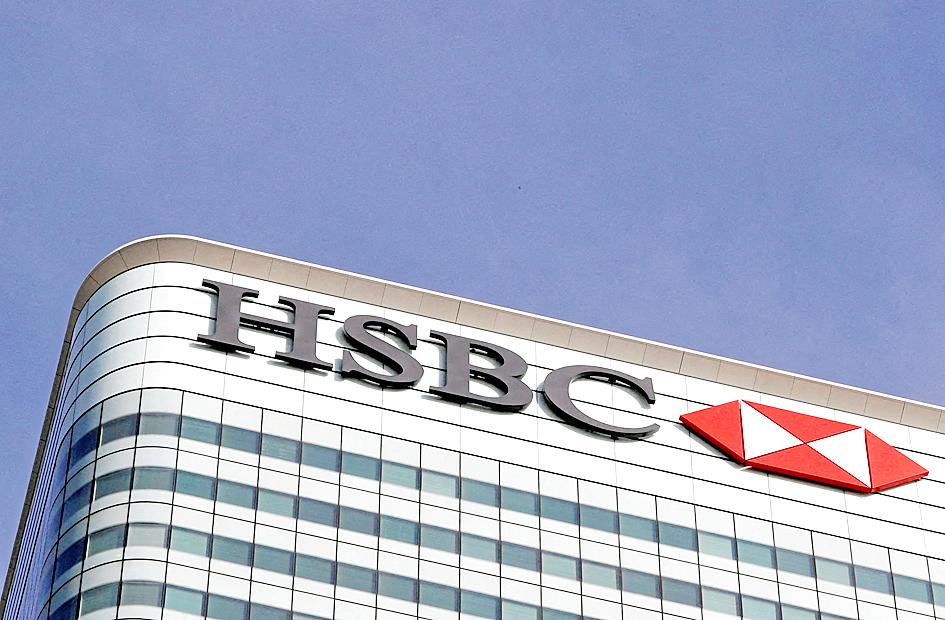HSBC Holdings PLC took a charge relating to its Chinese commercial real-estate exposure and warned of a weaker performance in its wealth business in Asia, blemishing results for last quarter that saw the lender boost plans to return billions of dollars to investors.
The London-based bank is to initiate a share buyback of as much as US$1 billion, on top of an earlier US$2 billion program, it said in an earnings statement yesterday.
The lender posted a 79 percent increase in adjusted pretax profit to about US$4 billion last quarter, roughly in line with company-compiled estimates.

Photo: Reuters
The bank said it will pay a second interim dividend of US$0.18 per share.
The US$450 million impairment charge — largely relating to offshore China commercial real-estate exposures booked on its Hong Kong balance sheets — was the result of local policy measures that had led to an increase in “refinancing risk and liquidity pressures,” HSBC chief executive officer Noel Quinn said in a telephone interview.
“Those market conditions have improved, to some extent, in the early part of 2022,” Quinn said.
HSBC chief financial officer Ewen Stevenson said that the conditions were not a one-off, but were “eminently manageable.”
Separately, Quinn said in an earnings statement that the lender carries “good business momentum” into this year, but it expects a weaker wealth performance in Asia this quarter.
HSBC follows other global banks in boosting shareholder returns as rising interest rates buoy lending income.
At the same time, the economic outlook is being clouded by factors including geopolitical tensions, inflation and effects of the COVID-19 pandemic, including in HSBC’s key market of Hong Kong.
A year ago, HSBC unveiled a strategic refresh with its pivot to Asia. The strategy is focused on managing more of the wealth of Asia’s growing ranks of millionaires and billionaires, as well as the region’s mass affluent.
The plan involves an investment of US$6 billion across Asia, targeting wealth management, commercial banking and markets.
The past years have been dominated by repeated restructurings that have included cutting 35,000 jobs, relocation of senior executives from London to Hong Kong, and most recently coping with the fallout from the pandemic.
However, HSBC said Hong Kong’s curbs on travel and social interaction are hurting the economy, and might affect the ability to hire and keep staff in the Asian financial hub.
“The evolving COVID-19 restrictions in Hong Kong, including travel, public gathering and social distancing restrictions, are impacting the Hong Kong economy, and may affect the ability to attract and retain staff,” the bank said.
HSBC’s comments came after Standard Chartered PLC CEO Bill Winters last week said that the territory’s travel curbs could in the long run hurt its status as a financial hub compared with other regional centers.
Additional reporting by Reuters

MULTIFACETED: A task force has analyzed possible scenarios and created responses to assist domestic industries in dealing with US tariffs, the economics minister said The Executive Yuan is tomorrow to announce countermeasures to US President Donald Trump’s planned reciprocal tariffs, although the details of the plan would not be made public until Monday next week, Minister of Economic Affairs J.W. Kuo (郭智輝) said yesterday. The Cabinet established an economic and trade task force in November last year to deal with US trade and tariff related issues, Kuo told reporters outside the legislature in Taipei. The task force has been analyzing and evaluating all kinds of scenarios to identify suitable responses and determine how best to assist domestic industries in managing the effects of Trump’s tariffs, he

TIGHT-LIPPED: UMC said it had no merger plans at the moment, after Nikkei Asia reported that the firm and GlobalFoundries were considering restarting merger talks United Microelectronics Corp (UMC, 聯電), the world’s No. 4 contract chipmaker, yesterday launched a new US$5 billion 12-inch chip factory in Singapore as part of its latest effort to diversify its manufacturing footprint amid growing geopolitical risks. The new factory, adjacent to UMC’s existing Singapore fab in the Pasir Res Wafer Fab Park, is scheduled to enter volume production next year, utilizing mature 22-nanometer and 28-nanometer process technologies, UMC said in a statement. The company plans to invest US$5 billion during the first phase of the new fab, which would have an installed capacity of 30,000 12-inch wafers per month, it said. The

Taiwan’s official purchasing managers’ index (PMI) last month rose 0.2 percentage points to 54.2, in a second consecutive month of expansion, thanks to front-loading demand intended to avoid potential US tariff hikes, the Chung-Hua Institution for Economic Research (CIER, 中華經濟研究院) said yesterday. While short-term demand appeared robust, uncertainties rose due to US President Donald Trump’s unpredictable trade policy, CIER president Lien Hsien-ming (連賢明) told a news conference in Taipei. Taiwan’s economy this year would be characterized by high-level fluctuations and the volatility would be wilder than most expect, Lien said Demand for electronics, particularly semiconductors, continues to benefit from US technology giants’ effort

‘SWASTICAR’: Tesla CEO Elon Musk’s close association with Donald Trump has prompted opponents to brand him a ‘Nazi’ and resulted in a dramatic drop in sales Demonstrators descended on Tesla Inc dealerships across the US, and in Europe and Canada on Saturday to protest company chief Elon Musk, who has amassed extraordinary power as a top adviser to US President Donald Trump. Waving signs with messages such as “Musk is stealing our money” and “Reclaim our country,” the protests largely took place peacefully following fiery episodes of vandalism on Tesla vehicles, dealerships and other facilities in recent weeks that US officials have denounced as terrorism. Hundreds rallied on Saturday outside the Tesla dealership in Manhattan. Some blasted Musk, the world’s richest man, while others demanded the shuttering of his